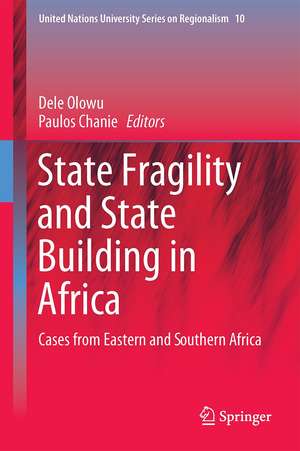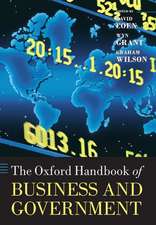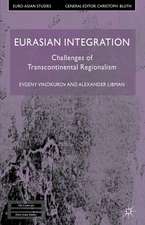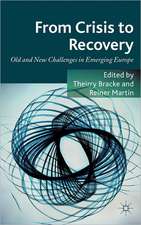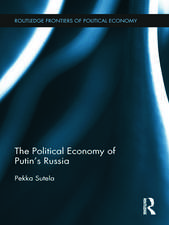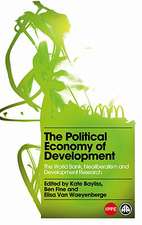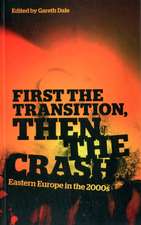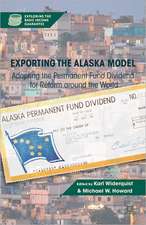State Fragility and State Building in Africa: Cases from Eastern and Southern Africa: United Nations University Series on Regionalism, cartea 10
Editat de Dele Olowu, Paulos Chanieen Limba Engleză Hardback – 28 oct 2015
| Toate formatele și edițiile | Preț | Express |
|---|---|---|
| Paperback (1) | 386.00 lei 6-8 săpt. | |
| Springer International Publishing – 23 aug 2016 | 386.00 lei 6-8 săpt. | |
| Hardback (1) | 393.35 lei 6-8 săpt. | |
| Springer International Publishing – 28 oct 2015 | 393.35 lei 6-8 săpt. |
Din seria United Nations University Series on Regionalism
- 15%
 Preț: 647.27 lei
Preț: 647.27 lei - 24%
 Preț: 790.70 lei
Preț: 790.70 lei - 18%
 Preț: 738.20 lei
Preț: 738.20 lei - 15%
 Preț: 645.47 lei
Preț: 645.47 lei -
 Preț: 395.09 lei
Preț: 395.09 lei - 15%
 Preț: 647.08 lei
Preț: 647.08 lei - 15%
 Preț: 651.67 lei
Preț: 651.67 lei - 18%
 Preț: 893.05 lei
Preț: 893.05 lei - 15%
 Preț: 641.20 lei
Preț: 641.20 lei -
 Preț: 442.46 lei
Preț: 442.46 lei - 18%
 Preț: 721.81 lei
Preț: 721.81 lei -
 Preț: 425.42 lei
Preț: 425.42 lei - 15%
 Preț: 646.11 lei
Preț: 646.11 lei - 18%
 Preț: 783.68 lei
Preț: 783.68 lei - 15%
 Preț: 690.94 lei
Preț: 690.94 lei - 15%
 Preț: 691.91 lei
Preț: 691.91 lei - 18%
 Preț: 727.80 lei
Preț: 727.80 lei - 18%
 Preț: 797.24 lei
Preț: 797.24 lei - 20%
 Preț: 560.30 lei
Preț: 560.30 lei -
 Preț: 433.68 lei
Preț: 433.68 lei - 15%
 Preț: 636.12 lei
Preț: 636.12 lei - 18%
 Preț: 940.09 lei
Preț: 940.09 lei - 20%
 Preț: 577.17 lei
Preț: 577.17 lei - 15%
 Preț: 642.51 lei
Preț: 642.51 lei -
 Preț: 394.12 lei
Preț: 394.12 lei -
 Preț: 391.61 lei
Preț: 391.61 lei
Preț: 393.35 lei
Nou
Puncte Express: 590
Preț estimativ în valută:
75.27€ • 78.58$ • 62.29£
75.27€ • 78.58$ • 62.29£
Carte tipărită la comandă
Livrare economică 04-18 aprilie
Preluare comenzi: 021 569.72.76
Specificații
ISBN-13: 9783319206417
ISBN-10: 3319206419
Pagini: 200
Ilustrații: X, 249 p.
Dimensiuni: 155 x 235 x 19 mm
Greutate: 0.54 kg
Ediția:1st ed. 2016
Editura: Springer International Publishing
Colecția Springer
Seria United Nations University Series on Regionalism
Locul publicării:Cham, Switzerland
ISBN-10: 3319206419
Pagini: 200
Ilustrații: X, 249 p.
Dimensiuni: 155 x 235 x 19 mm
Greutate: 0.54 kg
Ediția:1st ed. 2016
Editura: Springer International Publishing
Colecția Springer
Seria United Nations University Series on Regionalism
Locul publicării:Cham, Switzerland
Public țintă
ResearchCuprins
Chapter 1. Introduction. State Fragility and State Building in Africa.- Part I. Drivers of Fragility.- Chapter 2. Kenya: The Social Foundations of State Fragility: Challenges of AGrowing Democracy; Otieno Aluoka.- Chapter 3. Zimbabwe: Institutionalized Corruption and State Fragility; Langtone Maunganidze.- Chapter 4. South Africa: State Fragility as State Incapacity in the Post-Apartheid Era; Sifiso Ndlovu.- Part II. Impact of Fragility on Citizens and Neighbouring States.- Chapter 5. Zimbabwe: The Impact of Fragility on Social Services, 2000-2008; Norbert Musekiwa.- Chapter 6. Southern African Region: Regional Dynamics of Fragile States -Zimbabwe in the Southern Africa Region; Lee M. Habasonda.- Chapter 7. Ethiopia: Effectiveness of Capacity Building Programs in Fragile States; Wisdom Gagakuma and Zigiju Samuel.- Chapter 8. Angola: Overcoming Resource Curse: A Post-Conflict Governance Analysis; Albert Arko-Cobbah and Basie Olivier.- Chapter 9. Congo DRC: State Fragility And Capacity Building In Sub-Saharan Africa; Mukole Kongolo and Agostino M. Zamberia.- Chapter 10. Lesotho: Electoral Reforms and State Fragility; Oscar Gakuo Mwangi.- Chapter 11. Conclusion: From State Fragility to State Resilience; Way Forward.
Recenzii
In State Fragility in Africa: Impact and Capacity Building Approaches, Professor Dele Olowu examines the various manifestations of the subject through country case studies from Eastern, Central and Southern sub-regions of the African continent (Angola, the Democratic Republic of Congo, Kenya, Lesotho, South Africa, and Zimbabwe). Readers would find echoes of the issues examined in the book in the recent instability in Mali and the on-going crises in the Central African Republic and Southern Sudan. In a thoughtful and insightful concluding chapter, Olowu recommends a range of sensible measures for assuring strong governance institutions that can help mitigate the risks of fragility in African countries. This is a timely and well-researched contribution to the literature on state fragility in Africa.
- Ladipo Adamolekun, Professor of Public Administration and a former Lead Public Sector Management Specialist in the World Bank.
- Mohamed Salih, Professor Politics of Development both at the International Institute of Social Studies, Erasmus University Rotterdam (where he is Deputy Rector for Research) and the Department of Political Science, University of Leiden in the Netherlands.
- Mohamed Salih, Professor Politics of Development both at the International Institute of Social Studies, Erasmus University Rotterdam (where he is Deputy Rector for Research) and the Department of Political Science, University of Leiden in the Netherlands.
Notă biografică
Dr. Dele Olowu is a freelance consultant on governance and capacity development. He was formerly Professor of Administration and Local Government in Nigeria and has taught and conducted research in numerous other countries, including the Netherlands, Ethiopia, Ghana, Botswana, Namibia, Canada and the United States. He has served as adviser to African governments and the United Nations Economic Commission for Africa and the African Development Bank, as well as on development policy management boards in Africa and Europe. Olowu has pastored churches in Nigeria, Ethiopia and the Netherlands and currently oversees the network of Redeemed Christian Church of God churches in the Netherlands and the rest of mainland Europe. He has studied at the Universities of Ibadan and Ife and Birmingham University and is the author of several books and over 60 articles.
Dr. Paulos Chanie is an Ethiopian. He holds a Ph.D in Development Studies (2007) from The Institute of Social Studies, The Hague, Netherlands. Dr. Paulos has been teaching in tertiary level educational institutions, doing research and consulting for local and international organizations in areas of public policy and administration, development management, decentralization and civil service reform. He has published in the areas of public service management, ethnic politics, clientelism, civil service reform and decentralization. He has served as head of department at Addis Ababa University and General Secretary of Ethiop
ian Management Professionals Association. Dr. Paulos is currently an Assistant Professor at Addis Ababa University and the Director of Research at OSSREA (Organization for Social Science research in Eastern and Southern Africa).
Dr. Paulos Chanie is an Ethiopian. He holds a Ph.D in Development Studies (2007) from The Institute of Social Studies, The Hague, Netherlands. Dr. Paulos has been teaching in tertiary level educational institutions, doing research and consulting for local and international organizations in areas of public policy and administration, development management, decentralization and civil service reform. He has published in the areas of public service management, ethnic politics, clientelism, civil service reform and decentralization. He has served as head of department at Addis Ababa University and General Secretary of Ethiop
ian Management Professionals Association. Dr. Paulos is currently an Assistant Professor at Addis Ababa University and the Director of Research at OSSREA (Organization for Social Science research in Eastern and Southern Africa).
Textul de pe ultima copertă
This book describes the contrast between the strong economic growth and democratization that have occurred in Africa and its stalling political progress. It presents and discusses fragility as the phenomenon that has caused the state to remain weak and faltering and has led to at least one third of the continent’s citizens living in fragile states. Following the examination of the drivers of fragility and the impact of fragility on citizens and neighbouring states, the book discusses capacity building approaches. This part shows how effective states can be built on the African continent, a process that would result in a change from state fragility to state resilience. It is based on lessons learnt from close studies of the nations where the state has been most developed in the region, in Eastern and Southern Africa. The book provides and responds to the most recent and up-to-date information on African development and uses insights of people who have lived and worked in the continent for most of their lives.
Caracteristici
Provides a new paradigm for understanding the past and future of African politics Helps change thinking by African scholars on how to reconstruct the African state Is based on actual case studies in eight African countries Includes supplementary material: sn.pub/extras
